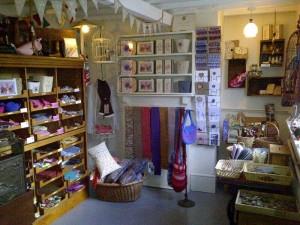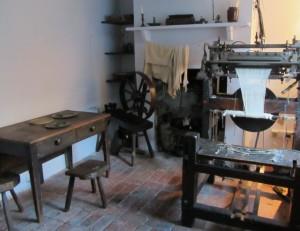In love-local
When my colleague Erin, invited me to join her on a visit to Framework Knitters Museum, although a relatively new member of the team I’m ashamed to say I knew very little about it.
I discovered that the museum is located in a quiet corner of the pretty village of Ruddington just south of the city. Blink and you might just miss it. Please don’t. This is a mesmerising journey into the birth of the knitting machine, the working & living conditions of the framework knitters, and how it all led to Nottingham’s establishment as a global centre for machine-produced lace in the 19th century. A place not to be passed by.
As we open the latch gate and step in to the delightful courtyard setting with pretty flowers and a small vegetable patch I instantly transform myself back to the 19th century, for when the scene is set. As I look over at the most charming rustic knitted bunting draped between the main house and the washrooms, I instantly imagine that back then it didn’t quite have the same appeal.
The main entrance area consists of a small but delightful tea room to the left, and to the right, the most charming & endearing museum gift shop, aptly named The Textile Emporium. It is adorned with locally made gifts and there is a distinct emphasis on textile pieces. Even the pens are made from lace bobbins. We met with Paul, the museum’s Manager who agrees to take us on this most significant & captivating journey in to a piece of Nottinghamshire’s heritage. We learn of the contrast in living conditions between the manager’s family and the workers, and the story is told as we explore the cottage and outbuildings.
There is an impressive display of framework machinery here that portray the cramped and uncomfortable conditions in which the workers produced their textiles. We learn how many of them were permanently deafened from the colossal noise of the machinery. Paul plays a recording of them in action and it’s hard to imagine how it was endured throughout their 17 hour working day. Although their creation meant that goods could be produced 100 times faster than knitting by hand, the machines involved very physical work operated by arm and leg movement.
As Paul demonstrates the mechanism, we discover how it was this framework machinery that led to the creation of the lace machines responsible for the now world famous lace making industry in Nottingham. I was overwhelmed to learn of this remarkable piece of history. He tells how Nottinghamshire’s framework knitters led to the birth of the Luddite movement. An act which eventually spread across the whole country and was a cry out for the rights of workers in response to machinery advancements. A sad tale of how the workers faced more work for less pay, adding more misery to their already poor & often squalid conditions.
We met with Paul, the museum’s Manager who agrees to take us on this most significant & captivating journey in to a piece of Nottinghamshire’s heritage. We learn of the contrast in living conditions between the manager’s family and the workers, and the story is told as we explore the cottage and outbuildings.
There is an impressive display of framework machinery here that portray the cramped and uncomfortable conditions in which the workers produced their textiles. We learn how many of them were permanently deafened from the colossal noise of the machinery. Paul plays a recording of them in action and it’s hard to imagine how it was endured throughout their 17 hour working day. Although their creation meant that goods could be produced 100 times faster than knitting by hand, the machines involved very physical work operated by arm and leg movement.
As Paul demonstrates the mechanism, we discover how it was this framework machinery that led to the creation of the lace machines responsible for the now world famous lace making industry in Nottingham. I was overwhelmed to learn of this remarkable piece of history. He tells how Nottinghamshire’s framework knitters led to the birth of the Luddite movement. An act which eventually spread across the whole country and was a cry out for the rights of workers in response to machinery advancements. A sad tale of how the workers faced more work for less pay, adding more misery to their already poor & often squalid conditions.  The museum is currently split over two sites, the second being the former Methodist church directly facing the main site. We took a sneaky peak and discovered collections that resurrect the evolution of hosiery - A pair of Queen Victoria’s stockings is the star attraction!
Paul’s passion for the site is evident as he tells of his plans to enhance the visitor experience to make it more informative and introduce more interactions (although I have to say the current offering surpassed my expectations). The improvements are something Paul is now able to fulfil thanks to funding received. The initial phase will see a Luddite Gallery open in spring 2014 and will be the first of its kind dedicated to the movement.
Framework Knitters Museum is one of those magical places that keeps our history alive and tells a prosperous story which warms the heart. Yet at the core lay hardship and troubles.
To this day it remains the region’s foremost attraction dedicated to the textile heritage of Nottinghamshire and most certainly worth a visit.
Both the tea room & Textile Emporium are open to the public aside from the museum.
The museum will host a very special Victorian Christmas event on Saturday 14 December.
The museum is currently split over two sites, the second being the former Methodist church directly facing the main site. We took a sneaky peak and discovered collections that resurrect the evolution of hosiery - A pair of Queen Victoria’s stockings is the star attraction!
Paul’s passion for the site is evident as he tells of his plans to enhance the visitor experience to make it more informative and introduce more interactions (although I have to say the current offering surpassed my expectations). The improvements are something Paul is now able to fulfil thanks to funding received. The initial phase will see a Luddite Gallery open in spring 2014 and will be the first of its kind dedicated to the movement.
Framework Knitters Museum is one of those magical places that keeps our history alive and tells a prosperous story which warms the heart. Yet at the core lay hardship and troubles.
To this day it remains the region’s foremost attraction dedicated to the textile heritage of Nottinghamshire and most certainly worth a visit.
Both the tea room & Textile Emporium are open to the public aside from the museum.
The museum will host a very special Victorian Christmas event on Saturday 14 December.
 We met with Paul, the museum’s Manager who agrees to take us on this most significant & captivating journey in to a piece of Nottinghamshire’s heritage. We learn of the contrast in living conditions between the manager’s family and the workers, and the story is told as we explore the cottage and outbuildings.
There is an impressive display of framework machinery here that portray the cramped and uncomfortable conditions in which the workers produced their textiles. We learn how many of them were permanently deafened from the colossal noise of the machinery. Paul plays a recording of them in action and it’s hard to imagine how it was endured throughout their 17 hour working day. Although their creation meant that goods could be produced 100 times faster than knitting by hand, the machines involved very physical work operated by arm and leg movement.
As Paul demonstrates the mechanism, we discover how it was this framework machinery that led to the creation of the lace machines responsible for the now world famous lace making industry in Nottingham. I was overwhelmed to learn of this remarkable piece of history. He tells how Nottinghamshire’s framework knitters led to the birth of the Luddite movement. An act which eventually spread across the whole country and was a cry out for the rights of workers in response to machinery advancements. A sad tale of how the workers faced more work for less pay, adding more misery to their already poor & often squalid conditions.
We met with Paul, the museum’s Manager who agrees to take us on this most significant & captivating journey in to a piece of Nottinghamshire’s heritage. We learn of the contrast in living conditions between the manager’s family and the workers, and the story is told as we explore the cottage and outbuildings.
There is an impressive display of framework machinery here that portray the cramped and uncomfortable conditions in which the workers produced their textiles. We learn how many of them were permanently deafened from the colossal noise of the machinery. Paul plays a recording of them in action and it’s hard to imagine how it was endured throughout their 17 hour working day. Although their creation meant that goods could be produced 100 times faster than knitting by hand, the machines involved very physical work operated by arm and leg movement.
As Paul demonstrates the mechanism, we discover how it was this framework machinery that led to the creation of the lace machines responsible for the now world famous lace making industry in Nottingham. I was overwhelmed to learn of this remarkable piece of history. He tells how Nottinghamshire’s framework knitters led to the birth of the Luddite movement. An act which eventually spread across the whole country and was a cry out for the rights of workers in response to machinery advancements. A sad tale of how the workers faced more work for less pay, adding more misery to their already poor & often squalid conditions.  The museum is currently split over two sites, the second being the former Methodist church directly facing the main site. We took a sneaky peak and discovered collections that resurrect the evolution of hosiery - A pair of Queen Victoria’s stockings is the star attraction!
Paul’s passion for the site is evident as he tells of his plans to enhance the visitor experience to make it more informative and introduce more interactions (although I have to say the current offering surpassed my expectations). The improvements are something Paul is now able to fulfil thanks to funding received. The initial phase will see a Luddite Gallery open in spring 2014 and will be the first of its kind dedicated to the movement.
Framework Knitters Museum is one of those magical places that keeps our history alive and tells a prosperous story which warms the heart. Yet at the core lay hardship and troubles.
To this day it remains the region’s foremost attraction dedicated to the textile heritage of Nottinghamshire and most certainly worth a visit.
Both the tea room & Textile Emporium are open to the public aside from the museum.
The museum will host a very special Victorian Christmas event on Saturday 14 December.
The museum is currently split over two sites, the second being the former Methodist church directly facing the main site. We took a sneaky peak and discovered collections that resurrect the evolution of hosiery - A pair of Queen Victoria’s stockings is the star attraction!
Paul’s passion for the site is evident as he tells of his plans to enhance the visitor experience to make it more informative and introduce more interactions (although I have to say the current offering surpassed my expectations). The improvements are something Paul is now able to fulfil thanks to funding received. The initial phase will see a Luddite Gallery open in spring 2014 and will be the first of its kind dedicated to the movement.
Framework Knitters Museum is one of those magical places that keeps our history alive and tells a prosperous story which warms the heart. Yet at the core lay hardship and troubles.
To this day it remains the region’s foremost attraction dedicated to the textile heritage of Nottinghamshire and most certainly worth a visit.
Both the tea room & Textile Emporium are open to the public aside from the museum.
The museum will host a very special Victorian Christmas event on Saturday 14 December.
Related
0 Comments
Comments
Comments are disabled for this post.

 to add an item to your Itinerary basket.
to add an item to your Itinerary basket.










